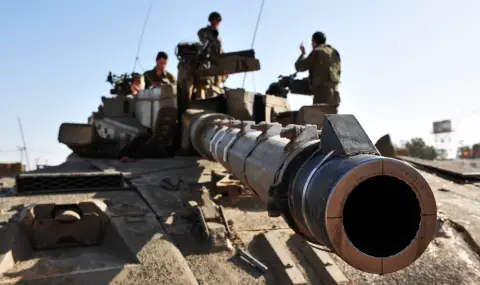The leaders of “Hezbollah” have repeatedly vowed to prevent 60,000 evacuated residents of northern Israel from returning to their homes, leading to an escalation of rocket attacks and Israeli airstrikes - all of which raises the possibility of a ground invasion of Lebanon, Israel's TPS news agency reported.
Experts described to TPS different scenarios for the war, but emphasized that the ground operation could be avoided.
Israel's escalating airstrikes “are not preparations for a ground operation, but a way to avoid it,” Professor Kobi Michael, a senior researcher at the Institute for National Security Studies at Tel Aviv University, told TPS.
Israel demonstrates its capabilities and shows that it is not afraid of war to make “Hezbollah” to agree to a diplomatic solution”, he said.
„What is happening now is an Israeli ultimatum to "Hezbollah" and also to Iran. The ultimatum states that the phase of the war of attrition is over and now Nasrallah and Khamenei must decide - a ceasefire in the north or a full-scale war,”, Yakov Lapin, a research associate at the Alma Research Institute, said in support of this thesis. stated to TPS
Litani River
If Israel does start a ground war, how deep into Lebanese territory will it go?
„The Litani River is a natural border,” says Professor Eyal Zisser, Vice-Chancellor of Tel Aviv University and Senior Research Associate at the “Moshe Dayan” Center for Middle East Studies. The Litani is the longest river in Lebanon, originating in the city of Baalbek, flowing through the Bekaa Valley to the south, then turning west and reaching the Mediterranean Sea near the city of Tyre.
According to UN Security Council Resolution 1701, which ended the Second Israel-Lebanon War of 2006, “Hezbollah” is prohibited from operating south of Litany.
However, Israel may decide to push deeper into Lebanese territory. There are two possible scenarios, says Professor Eitan Shamir, managing director of the Begin-Sadat Center for Strategic Studies, who lectures in political science at Bar-Ilan University. He is also the former head of the National Security Doctrine Department at Israel's Ministry of Strategic Affairs.
„In case of scenario “A“ the ground operation will be very limited, where Israel will not cross the Litani River. The goal is to distance “Hezbollah” from the border and allow the residents of the Israeli north to return to their homes”, Shamir said.
„This will not help against the rockets because they are launched from inside Lebanon. But first, there will be no anti-tank missiles,”, he added. “And secondly, “Hezbollah“ will not sit on the fence, threatening Israeli residents with an invasion similar to the one on October 7”, Shamir said
Scenario “B“, he explained, would be a riskier, larger-scale invasion reaching Beirut to destroy as much as possible the military potential of “Hezbollah”.
„As we did with „Hamas” in Gaza”, he said.
However, according to Michael, after Israeli soldiers cross the Lebanese border, a “limited operation” will not be an option.
„If a ground operation starts, it means total war and its aim will be to inflict critical damage on “Hezbollah”, as well as to destroy the terrorist infrastructure in Lebanon”, insists Michael.
„It should be done faster“
Most analysts agreed that it would take Israel three weeks to three months to create a security zone in Lebanon that would allow residents of the northern part of the country to return to their homes.
p>
„We cannot afford another 11 months to deal with “Hezbollah” in the northern part of the country”, emphasized Michael. “This should be done faster,”, he added.
Lapin said the first phase of the invasion would be an “intense attack on“Hezbollah” capabilities, military forces, launchers, operatives, tunnels, bunkers, command centers, while dealing with defense lines and the territorial unit of “Hezbollah““.
The second phase, Lapin said, will deal with eliminating attempts by “Hezbollah” to recover, which may take at least six months.
Asked about exit strategies from a ground operation, analysts agreed that Israel would have to ensure that “Hezbollah” will not be able to pass Litany again.
„The question is not when we will leave Lebanon, but what the day after will look like,” Zisser said.
According to Lapin, Lebanon's exit will depend on who implements Security Council Resolution 1701. The UN Interim Force in Lebanon, he added, “has completely failed to implement it”.
„You don't need to stay in the security zone forever to ensure that it is peaceful. The army can enter it when necessary, based on intelligence - as it does in Jenin or in Tulkarem,” Michael argued.
But Shamir noted that Israel would have to remain in the security zone “at least for a while”.
„And every temporary thing tends to become permanent, so maybe Israel will remain de facto,”, he added.
„Everyone was afraid to enter Gaza, and the army was fighting there excellently. We know how to win. This is what the army can take with them from Gaza to Lebanon,” Zisser said.
